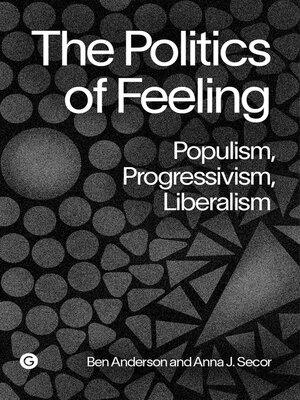The Politics of Feeling
ebook ∣ Populism, Progressivism, Liberalism · Goldsmiths Press / PERC Papers
By Ben Anderson

Sign up to save your library
With an OverDrive account, you can save your favorite libraries for at-a-glance information about availability. Find out more about OverDrive accounts.
Find this title in Libby, the library reading app by OverDrive.



Search for a digital library with this title
Title found at these libraries:
| Library Name | Distance |
|---|---|
| Loading... |
How today’s dominant political forms—right-wing populism, progressivism, and liberalism—offer differentiated responses to shared conditions of uncertainty.
The Politics of Feeling argues that politics has become a matter of political feelings in an age of uncertainty. The uncertainties of the post-2008 period have transformed the political arena and made the question of how people feel central to the formation of political affiliations and divisions. The book identifies three competing political forms in the US and the UK today: right-wing populism, progressivism, and contemporary liberalism. It argues that rather than naming coherent programs of political thought, these popular political forms are operating as arrangements or modes of attachment and political intensity. Each one suggests a different way of remembering the past, imagining the future, and making the present politically meaningful. Each one elevates some affective orientations over others and thereby etches differences of race, class, and gender within its structure. The Politics of Feeling is a critique of the living edge of politics, where feelings emerge, gather intensity, or dissolve in the continual making and remaking of the politics of the present.
The Politics of Feeling argues that politics has become a matter of political feelings in an age of uncertainty. The uncertainties of the post-2008 period have transformed the political arena and made the question of how people feel central to the formation of political affiliations and divisions. The book identifies three competing political forms in the US and the UK today: right-wing populism, progressivism, and contemporary liberalism. It argues that rather than naming coherent programs of political thought, these popular political forms are operating as arrangements or modes of attachment and political intensity. Each one suggests a different way of remembering the past, imagining the future, and making the present politically meaningful. Each one elevates some affective orientations over others and thereby etches differences of race, class, and gender within its structure. The Politics of Feeling is a critique of the living edge of politics, where feelings emerge, gather intensity, or dissolve in the continual making and remaking of the politics of the present.







